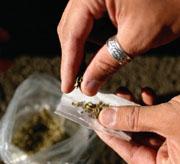 The more you use, the greater the risk.© Punchstock
The more you use, the greater the risk.© PunchstockUsing cannabis during adolescence or early adulthood increases the risk of developing psychotic symptoms, according to a study that tracked almost 2,500 young people. Crucially, those who are already predisposed to such problems are at a disproportionately greater risk when using the drug.
Psychiatrists found that those using cannabis have, on average, a 6% greater chance of suffering psychotic symptoms such as schizophrenia, delusions and paranoia, compared with those who don't take the drug. But for the 10% of people who are already vulnerable to such problems, such as those with a family history of schizophrenia, this figure leaps to 25%.
“If you are vulnerable, the more cannabis you use, the greater your risk of psychosis.”
Jim van Os
Maastricht University
What's more, these figures depend on the level of drug intake, particularly for those already in danger, says Jim van Os of Maastricht University in the Netherlands, who led the study. "If you are vulnerable, then the more cannabis you use, the greater your risk of psychosis," he told a press conference in London on 1 December.
Overall, his team found that volunteers who were predisposed to mental problems and frequently smoked cannabis had roughly a 50% chance of suffering psychotic symptoms within the four years of the study, which took place in Germany.
Drugs bust
Cannabis has already been linked to psychosis, but experts were unsure whether the drug itself causes problems, or whether psychotics are simply more likely to use it. The latest study, published in an online version of the British Medical Journal1, is the first to track the subsequent effects of cannabis use, rather than examining the past behaviour of psychiatric patients.
Neuroscientists suspect that the effects are down to cannabis's main psychoactive ingredient, delta-9-tetrahydrocannabinol (THC). This compound stimulates brain cells to release more of the neurotransmitter dopamine, a process that initially stimulates pleasure but can later also lead to paranoia or hallucinations.
"We're not saying that cannabis is the major cause of psychosis," says Robin Murray of the Institute of Psychiatry in London, who also studies the link between cannabis and mental health. Other factors that cause mental stress, such as emigrating, may have a greater effect, he suggests.
In fact, members of the study group, which consisted of 14-24-year-olds, had a 15% chance of showing symptoms at some point during the four years even if they did not smoke cannabis and had no predisposition to psychosis.
“I personally believe it should be legalized so it can be regulated.”
Zerrin Atakan
Institute of Psychiatry
Nonetheless, psychiatric carers need to be more aware of the link between cannabis and psychosis, argues Zerrin Atakan, also of the Institute of Psychiatry. "There's a shortage of knowledge and training," she says. "What I see as a clinician is that patients see the connection [at first], but when they start to get better they remember the pleasurable aspects of cannabis."
Cannabis advocates point to the drug's pain-relieving qualities as evidence that it is beneficial and should be prescribed for use in treating conditions such as multiple sclerosis. And those who argue that it should be legalized for recreational use claim that the drug's feel-good benefits outweigh any potential problems.
On the level
The problem is that black-market cannabis can contain wildly differing levels of THC, says van Os. "In the Netherlands concentrations are getting very high, up to 20% in some places. Youngsters think this is normal, but many of the old hippies in Amsterdam refuse to take it; they are used to 2 or 3%," he says.
"I personally believe it should be legalized so it can be regulated," says Atakan. "Then when you buy joints they will be labelled with how much THC they contain."
Encouraging openness and awareness is the key, agrees van Os: "Youngsters are very aware of their acute reactions to cannabis. For example, one in seven get paranoid ideas that they find distressing." Encouraging cannabis users to discuss such problems could have the knock-on effect of reducing the drug's public-health impact, he suggests.
Maastricht University
Institute of Psychiatry
-
References
- Henquet C., Br. Med. J, published online at http://bmj.bmjjournals.com/onlinefirst_date.shtml (2004).
